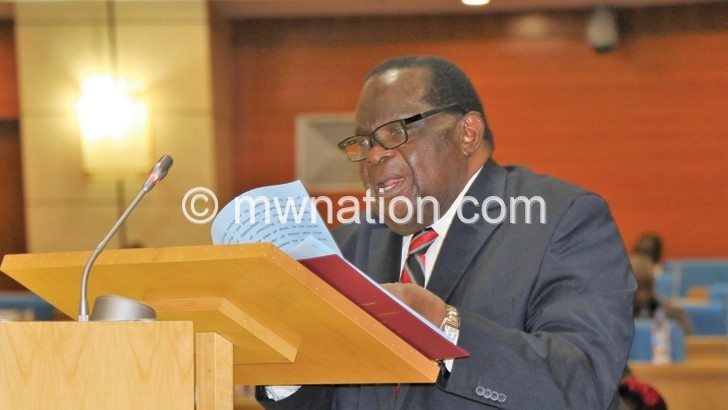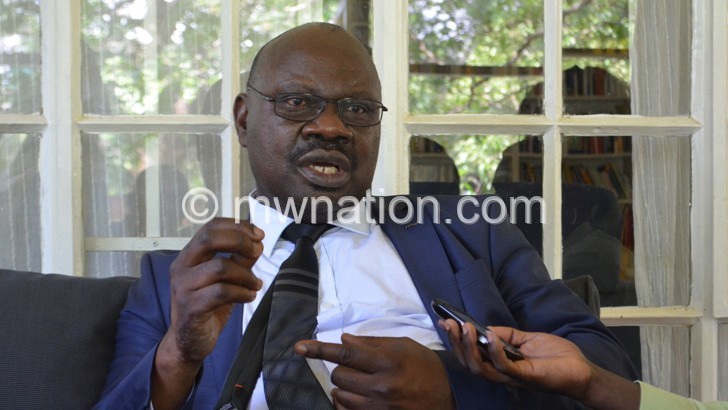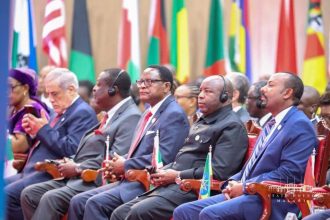AG evasive on IFMIS saga
- Bidding was done in 2015.
- 12 bidders expressed interest.
- World Bank pulled out, process halted.
- K5 billion set aside to be used.
- Procurement process has restarted.
- Twenty Third Century was the third successful bidder.
- Highest bid was $13m
The Accountant General cannot explain why the government is planning to engage a Zimbabwean firm, Twenty Third Century, to provide software solutions called Enterprise Resource Planning (ERP) to operate Ifmis three years after 12 bidders expressed interest.

At the centre of the hunt for the new Ifmis provider is the Accountant General Chrighton Chimombo, who could not immediately explain what has prompted government to take this route.
In a response to a questionnaire, Chimombo referred the matter to the Ministry of Finance, Economic Planning and Development spokesperson Davis Sado.
“The Ministry of Finance will come with a clarification on the procurement and implementation of the new Ifmis in due course,” Sado said.
He, however, declined to comment further, saying the questions are specific to the Accountant General’s office.

any document
Secretary to Treasury Ben Botolo advised this reporter, in a telephone interview last week, to talk to the Accountant General to understand the reasoning behind the decision.
“We have been on it and the best thing is to restart the whole thing once again and deal with the matter,” he said.
Botolo explained that his fear is that since a lot of things might have changed since the bidding was done in 2015. He said what is also worrying is that the price would escalate.
“In a normal situation, I will be surprised that the vendor would say he is going to maintain the same price. That’s why I am saying the best way to go is to redo the whole proces—tender it and come up with a fresh cost and all that. I have advised him [Chimombo], but their position is that we should go ahead with the current process,” said Botolo, who conceded that he seems powerless because the whole process is handled at the Accountant General.
Botolo also contradicted Chimombo, who told the media recently that government has put aside K5 billion to train members of staff that will be managing Ifmis.
Botolo, however, said the money will go towards the procurement of Ifmis, which means they are starting it right now.
“Initially, it was supposed to be jointly done by the World Bank and the Malawi Government, but the World Bank pulled out because they said their contribution was just $2 million while that of government is about $12 million,” he said.
Botolo said it was only after the World Bank had pulled out that they started the whole process again.
He said acquiring the vendor has been a hassle and this is the reason government is now discussing with Twenty Third Century, which was third among the successful bidders.
Budget and Finance Committee of Parliament chairperson Rhino Chiphiko has said they know government is deliberately dilly-dallying in the procurement of a new Ifmis as they are perpetuating Cashgate.
“Although our role is oversight, we do not get involved in issues of procurement, but when things come up we speak against them or for them,” he said.
Chiphiko said as a committee they are looking for more information leading to the process of the procurement.
A source at Treasury indicated that Twenty Third Century, the Zimbabwean firm, has been given an award letter as the vendor to operate Ifmis, although their 2015 bid price of $13 807 561.46 is on the higher side for Malawi.
In the 2018/19 National Budget, procurement of Ifmis has been allocated K5 billion.
Twenty Third Century also puts its recurring costs every three years at $3 086 294.73, which the tax payer would have to cough up.
Botolo agreed that, indeed Twenty Third Century is expensive and this is the reason government has been trying to do something on this issue considering that it was done in 2015.
He said the Accountant’s General’s office is negotiating with the company considering that the first successful bidder had put their price at about $7 million while the other one was at about $12 million.
Botolo also said in as far as his office is concerned, if the Twenty Third Century has been given the offer, then that has to be through Chimombo’s office since it is that office that handles the Ifmis and that, he (Botolo) has not signed any document.
Botolo also said he had not seen any such paperwork.
He also said once the next vendor has been identified, it might take some time to have the software running full-throttle because the new Ifmis will run concurrently with the current one for one or two years.
“There are issues of soft and hardware that have to be resolved in line with compatibility with the servers. All that has to be taken into account. Apart from this, we want the new Ifmis to interface with the Human Resource Management Information System,” he said.
The bid opening was conducted in Salima on September 11 2015 where 12 bids were opened and their respective prices were announced, which this reporter has seen.
Transnational Computer Technologies had set its bid price at $12 200 000.00 and at a recurring cost of $1 418 780.21 for five years.
Another firm, Free Balance, had set its offer at S$13 995 935.00.
Information we have sourced indicate that the other bidders include KPMG whose total bid price was $47 858 154.00; TBL whose bidding price $6 573 326.04; Neurotech whose bidding price was $8 883 110.53; State Informatics Sparc Systems Novabase whose bidding price was $28 241 975.00.
Others were Tech Mahindra Limited, whose bidding price was $13 859 996.00; Timestamp whose bidding price was $30 141 770.00; Soft Tech Consultants Ltd, Epcor whose bidding price was $10, 316, 934; Intrasoft Int. TechNet Verve K.O. whose bidding price was $23 096 914.29; and Cleoliv Int. Smart Link Ltd whose bidding price was $14 500 000.
The validity of all the 12 bids was between January 31 2016 and August 21 2016.
As part of the Public Financial Management reforms, Government, in 2005, appointed Soft-Tech Consulting Limited (Soft-Tech), an Epicor Ltd software solutions technology partner, to implement an Epicor based Ifmis.
Ifmis is a common information and communication technology (ICT) platform which integrates core public financial management (PFM) functions to ensure efficient management of public resources.
However, due to massive theft of public resources as Ifmis was manipulated, government engaged a Business Process Review study carried out by the task force which proposed a complete replacement of the system by identifying another vendor.
Treasury constituted a team to study the option of upgrading and replacing Ifmis.
Government targeted top-five ranked Ifmis ERP solutions in order of rank SAP; Oracle Financials; Microsoft Dynamics; Infor; and Epicor.
Government started calling for bids through the local press of January 22 2015 before withdrawing it on January 30, 2015 amid pressure for a number of anomalies in the whole process.
Government started calling for bids to have a new service provider that would replace SofTech providers of Epcor software Ifmis that led to Cashgate.
A report produced based on public financial activities that took place between January 2009 and December 2014 faulted the weakness in the Ifmis.
The report which is a result of analysis of financial data by PricewaterhouseCoopers Advisory Services (Pty) Limited (PwC) which was contracted by the Auditor General shows that an anomaly on 1 911 cheques that were posted and could not be reflected in the Cashbook indicate a control weakness in Ifmis.
Public relations officer for the Office of the Director of Public Procurement (ODPP) Grace Thipa whose office has since changed to Public Procurement and Disposal of Assets Authority (PPDA) explained that there are two positions within the procurement law regarding long elapsed period of three years.
“The first position is that if either party is just quiet then, this can be declared time barred and nullified. But where there were continuous discussions, negotiations, or legal tussles as in this case, the mitigation is to enter into negotiations to the benefit of both parties,” said Thipa in a questionnaire response.
She also explained that the process of clearing procurement submissions is based on combined recommendations and approvals by both the evaluation teams and Internal Procurement and Disposal Committees.
Thipa who confirmed that ODPP granted a No Objection to Twenty Third Century of Zimbabwe added that her institution only checks whether the procurement process was transparent, fair and clear the same for the entity to proceed awarding the contracts.
She, however, said her office needed to check and confirm if indeed the Secretary to the Treasury advised ODPP that the process should be re-tendered.
Although records show that the validity period for all the bids documents submitted by the 12 bidders expired back in 2015, she parried suggestions that this might be challenged legally saying the procurement entities have a duty to continuously seek extensions of validity periods.





